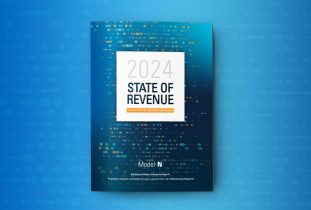Revenue management in the life sciences industry requires proficiency in a wide range of functions and disciplines. To do it successfully, you need to understand – at a minimum – market demand for your products, their price elasticity, your customers’ changing wants and needs, and the competitive landscape, which is also constantly shifting.
If you’re doing revenue management in-house, you also require seasoned professionals who are experts in pricing, forecasting, inventory management, and distribution. You must be adept at managing relationships with customers, partners, and suppliers to ensure contract conditions are met and maximized for profit. You also must comply with a growing assortment of local, regional, and international laws.
Finally, there’s the technology. You need a sophisticated, integrated revenue management platform to combine all this.
If all this sounds onerous, you’ll understand why increasing numbers of life sciences companies are outsourcing revenue management, according to a new report by the Everest Group. The “Growing Importance of Outsourcing in Life Sciences Revenue Management” report offers information to help life sciences companies understand their options and drive better decisions.
In this blog, we’ll share insights from the report and highlight technology’s importance in your outsourcing strategy.
The outsourcing models
The Everest Group has identified three models which life sciences companies can leverage to outsource revenue management: business process outsourcing (BPO), BPO paired with software-as-a-service (SaaS), and shared services.
Business process outsourcing (BPO)
Business process outsourcing (BPO) of revenue management for life sciences firms involves transferring certain or all aspects of revenue management to a third-party service provider. This includes financial forecasting, pricing strategies, revenue analytics, billing, and revenue cycle management. You can outsource some or even all revenue management tasks to the BPO provider, which can leverage your existing revenue-management technology tools or use its own. The financial terms of the contract depend on your needs and mutual preferences.
In most cases, the outsourcing vendor purchases the revenue management technology as part of their service. It may even own and market its own solution. However, you may also decide to purchase software of your choice and then grant the service provider access to it and your data, especially if you prefer a particular solution or have security concerns. The service provider usually has the expertise to effectively install, configure, and integrate the solution with your existing systems.
BPO and software-as-a-service (SaaS)
When BPO is coupled with a software-as-a-service (SaaS) revenue management solution, it offers a comprehensive, streamlined, and cost-effective way to manage your revenue-related processes, combining the best of both worlds: industry expertise and technological benefits.
You can coordinate with the BPO to agree on a SaaS solution or use multiple technology options that suit your specific needs. This might be a solution the BPO provider owns, already uses, or a new one chosen for its features. The BPO may handle the setup and integration of the revenue management SaaS software with your existing systems. Because of the nature of the SaaS model, there’s no need for on-premises installation of hardware or software. The BPO team then uses the SaaS software to manage your revenue processes. You get greater control and access to tools to monitor performance, generate reports, or handle specific tasks.
Shared services
Going to a shared services model is another form of outsourcing, even though responsibility for revenue management stays within your organization. “Shared services” are when you consolidate business operations used by multiple parts of your enterprise in a central “location.” Instead of duplicating functions in every business unit, a central hub of expertise shares the operational burden while also being a center of excellence. In effect, your individual departments are outsourcing to another, internal department.
Shared services outsourcing delivers numerous benefits, including cost savings, improved service quality, standardization of processes, and the ability to leverage specialized skills and technologies. However, it also requires a significant investment in technology and change management to ensure a smooth transition from decentralized functions to shared ones and cultivating internal expertise to effectively address the unique needs of revenue management.
Here, too, technology is critical. You aim to have integrated, efficient, and robust systems that can manage complex and large-scale tasks while ensuring data security and compliance with regulatory standards. Automation can handle repetitive tasks more efficiently and with fewer errors, freeing up staff for more complex tasks. Artificial intelligence (AI) can provide advanced capabilities like intelligent data analysis and predictive modeling.
Technology key to outsourcing success
Even when outsourcing, outdated infrastructure, inadequate data management, and siloed data hinder rebate management, create chargeback errors, and result in downstream inefficiencies. A solid technological foundation is therefore critical for your outsourcing initiative to succeed.
Some questions to ask yourself about your technology capabilities as you consider outsourcing include:
- Does your current revenue management software help you reach your financial and compliance goals?
- How coherent is your revenue data? Is it integrated or fragmented into silos? Do you have real-time visibility into sales, rebates, and compliance? Can you use data to get insights for business decision-making?
- Can you track key performance indicators (KPIs) that measure the success of your revenue management process?
The decision about who is responsible for buying, deploying, and using revenue management software will depend on the specifics of your outsourcing agreement.
In most cases, the outsourcing service provider purchases the software because it’s part of their service. However, you may decide to purchase the software and then grant the service provider access, especially if you prefer a particular software solution or have data security concerns.
The key is clear communication and a well-defined contract between yourself and the outsourcing provider. This ensures that responsibilities are clear, and that the software is used effectively. Remember that the specifics can vary greatly from one contract to another based on the needs and preferences of the parties involved.
Assess what’s best for you
As you consider your options for revenue, it’s critical to have a roadmap to follow. The Everest Group report outlines an enterprise blueprint for successful revenue management outsourcing. In addition to providing step-by-step advice, the report also provides a checklist of what to look for in an outsourcing partner to deliver a combination of domain expertise and technological superiority.
Download the Everest Group report to gain insights into benefits by company size and access the blueprint and checklist today.
To learn more about revenue management outsourcing excellence, watch our webinar with Moderna.
















